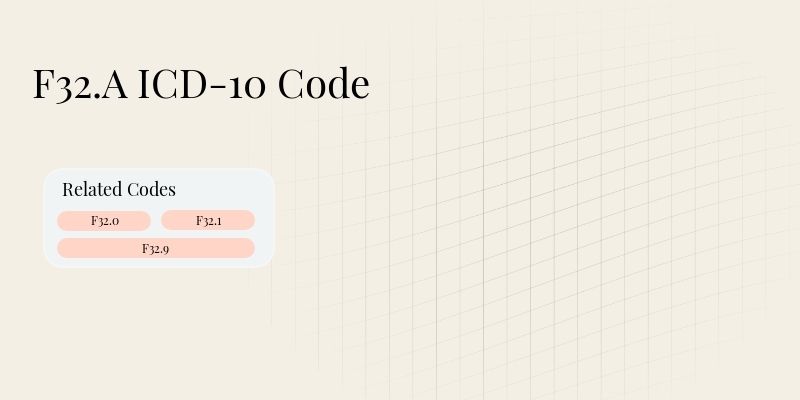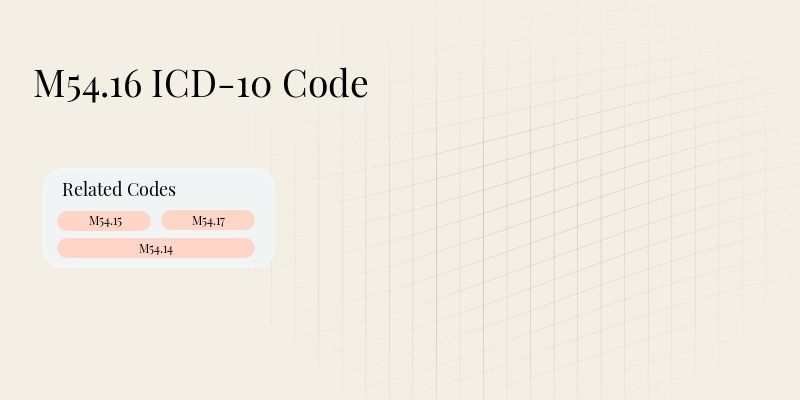
F32.A ICD-10 Code: Depression, Unspecified

Key Takeaways
- What F32.A ICD-10 Code Covers: The code represents unspecified depression, indicating cases where the clinician has identified depressive symptoms, but the specific type or severity is not defined. This allows for flexibility in diagnosis when complete information is not available.
- Session duration requirements: There are no strict session duration requirements, but comprehensive evaluation and appropriate treatment duration are essential for effective management of the condition.
- Who can use the code: This code can be used by various healthcare professionals, including psychiatrists, psychologists, primary care physicians, and other licensed mental health practitioners authorized to diagnose and treat mental health conditions.
- Best practice for proper use: Ensure comprehensive documentation of the patient's symptoms and treatment plan. Accurate coding helps prevent billing errors and supports the claim process during audits.
- Example of actual usage: A patient presents with persistent sadness and fatigue but does not meet the criteria for a specific depressive disorder. The clinician may diagnose them with unspecified depression and use F32.A for billing purposes.
What is F32.A ICD-10 Code
The F32.A ICD‑10 code is designated for "Depression, Unspecified." It is used when a clinician recognizes depressive symptoms that do not fit into more defined diagnostic categories such as major depressive disorder or persistent depressive disorder. This code allows healthcare providers to report cases where the specifics of the depression are yet to be fully assessed or where the symptoms are present but do not meet the diagnostic criteria for a specific depressive disorder.
By using this code, practitioners can still document the patient's mental health needs, facilitating appropriate treatment while ensuring that the medical records are accurate. This coding option is crucial for situations where a patient's condition may evolve or where there is insufficient information to make a more specific diagnosis.
Services Covered Under F32.A ICD-10 Code
Various mental health services can be billed under this code. The following table outlines the covered services:
Service Type | Description |
|---|---|
Psychiatric Evaluation | An initial assessment to determine the patient's mental health status and the presence of depressive symptoms. |
Individual Therapy | Therapeutic sessions focusing on the patient's emotional and psychological well-being, addressing unspecified depression symptoms. |
Medication Management | Monitoring and adjusting medications prescribed for depression, ensuring effective treatment. |
Group Therapy | Facilitated sessions with other patients, providing support and shared experiences related to depression. |
Who Can Use the F32.A ICD-10 Code?
Several healthcare professionals can effectively use this code in their practice. Below are the key roles:
- Psychiatrists: Specialists in mental health who can diagnose and treat various mental disorders, including depression.
- Psychologists: Professionals trained in psychological assessment and therapy, often engaged in treating clients with depression.
- Primary Care Physicians: General practitioners who identify and manage mental health conditions within the context of overall health.
- Licensed Clinical Social Workers: Professionals who provide therapy and support services, often working with depressed patients.
How to Use F32.A ICD-10 Code
To use this code correctly, follow these guidelines:
- Accurate Diagnosis: Ensure a thorough assessment before coding. For example, if a patient reports feelings of sadness but does not meet major depressive disorder criteria, F32.A is appropriate.
- Documenting Symptoms: Record specific symptoms experienced by the patient, such as fatigue or loss of interest, to support the diagnosis.
- Linking to Treatment Plans: When coding, align the diagnosis with the treatment plan. For instance, if the patient is undergoing therapy for unspecified depression, document that correlation.
Reimbursement Rates for F32.A ICD-10 Code
Insurance Type | Reimbursement Rate |
|---|---|
Medicare | $90 - $120 per session |
Medicaid | $70 - $100 per session |
Private Insurance | $80 - $150 per session |
Disclaimer: Reimbursement rates can change frequently and depend on numerous factors, including the provider's location and patient coverage. This article will be updated with average rates as they change.
Benefits of F32.A ICD-10 Code
This code brings several benefits to practitioners and patients alike. The following table summarizes these advantages:
Benefit | Description |
|---|---|
Flexible Documentation | Allows for a broader range of symptoms to be documented when specific diagnosis criteria aren't met. |
Improved Treatment Access | Facilitates access to necessary mental health services for patients experiencing depressive symptoms. |
Insurance Reimbursement | Ensures providers can receive payment for services rendered related to depression management, promoting sustainability. |
Common Mistakes to Avoid with F32.A ICD-10 Code
Misuse of this code can lead to audits, claim denials, and potential financial losses. Being aware of common mistakes can help mitigate these risks:
- Vague Documentation: Failing to provide clear documentation of the patient's symptoms may lead to denial of claims. For example, a mental health professional might simply note "depression" without detailing the symptoms or treatment plan.
- Incorrect Patient History: Not including relevant patient history can result in coding errors. For instance, a clinician might overlook past depressive episodes, which could affect the diagnosis.
- Inconsistent Coding: Using multiple codes for the same condition inconsistently can confuse billing. A provider might alternate between F32.A and a more specific depression code without justification.
- Ignoring Follow-up Care: Not coding for follow-up sessions or ongoing treatment can lead to incomplete claims. For example, if a patient returns for therapy sessions without documentation of prior visits, it may raise questions during audits.
F32.A ICD-10 Code vs Other Codes
It’s important to compare this code with similar codes to understand its specific application and context. The following table outlines key differences:
Code | Description | Specificity Level |
|---|---|---|
F32.A | Depression, Unspecified | General |
F32.0 | Major Depressive Disorder, Single Episode | Specific |
F33.0 | Major Depressive Disorder, Recurrent Episode | Specific |
Conclusion
The F32.A ICD‑10 code for unspecified depression serves as a vital tool for healthcare professionals in accurately documenting and billing for mental health services. By allowing for flexible diagnosis, it enables practitioners to provide necessary treatment even when specific criteria are not fully met. Understanding the services covered, reimbursement rates, and benefits associated with this code empowers providers to enhance patient care while navigating the complexities of insurance billing. Avoiding common mistakes ensures compliance and supports the financial sustainability of mental health practices. As healthcare continues to evolve, staying informed about coding practices will remain essential in delivering effective mental health services.
Disclaimer: This article is for informational purposes only and does not constitute legal or medical advice. Always consult professional guidelines and regulatory bodies for specific compliance requirements.
Frequently Asked Questions
Reduce burnout,
improve patient care.
Join thousands of clinicians already using AI to become more efficient.

F41.1 ICD-10 Code: Generalized Anxiety Disorder
Discover essential insights on the F41.1 ICD-10 Code code for health professionals. Enhance your practice and navigate billing with confidence.

PR-1 Denial Code: Patient Responsible - Deductible Amount
Discover essential insights on the PR-1 Denial Code code for health professionals. Enhance your practice and navigate billing with confidence.

M54.16 ICD-10 Code: Lumbar Radiculopathy
Discover essential insights on the M54.16 ICD-10 Code code for health professionals. Enhance your practice and navigate billing with confidence.
